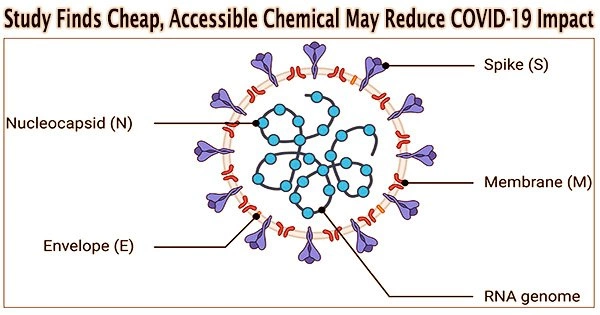An affordable, easily accessible amino acid may be able to reduce the disease’s consequences and offer a potential over-the-counter treatment option for infections with SARS-CoV-2 variations and maybe future novel coronaviruses, according to preclinical research in mice that replicate human COVID-19.
An amino acid known as GABA, which is widely available over the counter in many nations, was found to lessen disease severity, viral load in the lungs, and death rates in SARS-CoV-2-infected mice, according to a team of researchers from UCLA’s David Geffen School of Medicine. This follows up on their previous finding that GABA consumption also protected mice from another lethal mouse coronavirus called MHV-1.
When administered shortly after infection or several days later, close to the peak of virus production, GABA therapy was successful in both situations. The protective properties of GABA against two separate coronaviruses suggest that GABA may offer a widely applicable medication to assist in treating illnesses brought on by novel beta-coronaviruses and new SARS-CoV-2 variants.
“SARS-CoV-2 variants and novel coronaviruses will continue to arise, and they may not be efficiently controlled by available vaccines and antiviral medications. Furthermore, the generation of new vaccines is likely to be much slower than the spread of new variants,” said senior author Daniel L. Kaufman, a researcher and professor in Molecular and Medical Pharmacology at the David Geffen School of Medicine at UCLA.
Accordingly, new therapeutic options are needed to limit the severity of these infections. Their earlier research shown that GABA treatment prevented mice infected with the MHV-1 mouse coronavirus from suffering from a serious illness. They studied transgenic mice that, when infected with SARS-CoV-2, develop severe pneumonia with a high death rate in order to more rigorously assess the possibility of GABA as a therapeutic for COVID-19.
“If our observations of the protective effects of GABA therapy in SARS-CoV-2-infected mice are confirmed in clinical trials, GABA could provide an off-the-shelf treatment to help ameliorate infections with SARS-CoV-2 variants. GABA is inexpensive and stable at room temperature, which could make it widely and easily accessible, and especially beneficial in developing countries,” said Daniel L. Kaufman.
SARS-CoV-2 variants and novel coronaviruses will continue to arise, and they may not be efficiently controlled by available vaccines and antiviral medications. Furthermore, the generation of new vaccines is likely to be much slower than the spread of new variants.
Daniel L. Kaufman
According to the researchers, the brain’s primary neurotransmitter system is most frequently thought of as being composed of GABA and GABA receptors. They and other researchers discovered years ago that immune system cells have GABA receptors as well, and that activating these receptors prevented immune cells from acting in an inflammatory manner. Taking advantage of this characteristic, the authors showed in a series of research that GABA treatment suppressed the development of animal models of autoimmune disorders like type 1 diabetes, multiple sclerosis, and rheumatoid arthritis.
Researchers that focus on gas anesthetics have discovered that lung epithelial cells also have GABA receptors and that medications that stimulate these receptors may be able to reduce lung inflammation and damage.
The simultaneous effects of GABA on lung epithelial cells and inflammatory immune cells, together with the drug’s safety for therapeutic usage, make it an intriguing choice for reducing the inflammatory immune responses and lung damage brought on by coronavirus infection.
The UCLA research team in this study, in collaboration with colleagues at the University of Southern California, gave GABA to the mice shortly after SARS-CoV-2 infection, or two days later, when the virus levels in the animal lungs were close to their peak. While the majority of untreated mice died from this infection, those that received GABA either immediately after infection or two days later experienced less severe illness and a lower death rate over the course of the trial.
Additionally, treated mice showed decreased viral levels in their lungs and adjustments in circulating cytokines and chemokines, immunological signaling molecules linked to better results in COVID-19 patients. Thus, GABA receptor activation had multiple beneficial effects in this mouse model that are also desirable for the treatment of COVID-19.
The authors anticipate using their latest findings as a springboard to investigate the effectiveness of GABA therapy in clinical studies including COVID-19 patients. Clinical trials of GABA therapy for COVID-19 can be started right away due to its high level of safety, low cost, and global availability.
The scientists hypothesize that the GABA-receptor activating medicines’ anti-inflammatory effects may also be helpful for reducing inflammation in the central nervous system linked to long-COVID.
In fact, this strategy was quite effective in their earlier mouse investigations of treatments for multiple sclerosis, a condition brought on by an inflammatory autoimmune response in the brain. According to the authors, these medications might lessen the negative side effects of coronavirus infection in the peripheral nervous system as well as the inflammation in the brain.
Unfortunately, there has been no pharmaceutical interest in pursuing GABA therapy for COVID-19, presumably because it is not patentable and widely available as a dietary supplement. The authors hope for federal funding to continue this line of study.
The researchers stress that GABA should not be used for the treatment of COVID-19 until clinical trials are carried out and it is authorized for doing so by pertinent regulating bodies as it may pose health hazards, such as inhibiting healthy immune or physiological responses.
Additional authors include Jide Tian, Barbara Dillion, High Containment Program at UCLA, and Jill Henley and Lucio Comai, Keck School of Medicine at USC.
Funding: This work was supported by a grant to DLK from the UCLA DGSOM-Broad Stem Cell Research Center, the Department of Molecular and Medical Pharmacology, and the Immunotherapeutics Research Fund. Work at USC was supported by a grant from the COVID-19 Keck Research Fund to LC.
Conflicts of interests: DLK and JT are inventors of GABA-related patents. DLK serves on the Scientific Advisory Board of Diamyd Medical. BD, LC and JH have no financial conflicts of interest.





